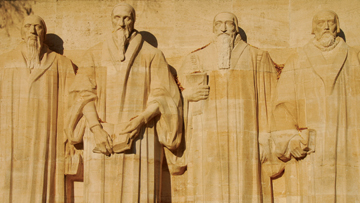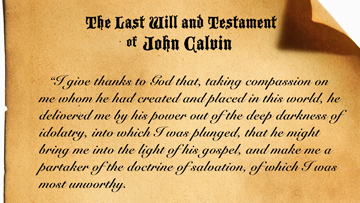You have free articles remaining this month.
Subscribe to the RP Witness for full access to new articles and the complete archives.
July marks the 500th anniversary of John Calvin’s birth. In celebration of this milestone, many in the Reformed community are paying due tribute to this father in the faith. Several volumes praising Calvin’s work have been published this year. Many seminaries and denominations have sponsored a Calvin conference in Geneva, Switzerland—the city where Calvin labored for most of his life.
It is appropriate for us, in the Reformed Presbyterian Church of North America, to be a part of this commemoration because we owe such a great debt to this famous Frenchman. Calvin’s theology shaped the Westminster Standards—to which our denomination subscribes—and his zeal for the purity of God’s worship has molded our thinking and practice to this day. How can we best honor a man who has impacted our theology and piety so much? One way would be to examine critically an influential writing or sermon and see how it applies to 21st Century Christians.
Many fine analyses of Calvin’s major works have been written by elite Calvin scholars, and these are readily available. We will focus on an aspect of Calvin’s life and ministry that is often neglected but perhaps fruitful to explore—Calvin’s personal letters. In studying these letters, we will be able to get a flavor of Calvin’s theology as it functioned in day-to-day life. It will also give us a different side of Calvin than perhaps we’re used to. Here we will see Calvin laboring as a shepherd over God’s sheep, fighting for the purity of God’s worship, grieving over the death of his beloved wife, and giving glory to God in the most painful of circumstances.
Calvin’s literary output was not confined to his Institutes and commentaries. According to B.B. Warfield, Calvin was “the great letter-writer of the Reformation age.” His nearly 3,000 letters vary widely in content; yet one thread unites them—Calvin’s zeal to uphold God’s sovereignty. We should not conceive of this zeal narrowly and restrict it to predestination and reprobation; rather, we should think of it as permeating all aspects of his life and thought.
Ecclesiastical Matters
Many of Calvin’s letters pertain to ecclesiastical matters. The topics of these range from advice on marriage to strong censures of budding heretics. One famous ecclesiastical letter has to do with Calvin’s return to Geneva. In 1538, Calvin and his friend, William Farel, were booted from the Swiss city because their reforms were seen as extreme. Calvin landed in Strasbourg and did not care to return to his former residence. In fact, he wrote that he would rather “submit to death a hundred times” than return to Geneva! He later called the city “that cross on which I had to perish daily a thousand times over.”
Three years after his dismissal God called Calvin back to Geneva. In a letter to Farel, we can see Calvin’s absolute resignation to God’s will: “As to my intended course of proceeding, this is my present feeling: had I the choice at my own disposal, nothing would be less agreeable to me than to follow your advice [i.e. to return to Geneva]. But when I remember that I am not my own, I offer up my heart, presented as a sacrifice to the Lord.”
Towards the end of the letter, Calvin further elaborated: “I am well aware, however, that it is God with whom I have to do, from whose sight such crafty imaginations cannot be withheld. Therefore I submit my will and my affections, subdued and held-fast, to the obedience of God; and whenever I am at a loss for counsel of my own, I submit myself to those by whom I hope that the Lord himself will speak to me.”
In an ecclesiastical letter of another sort, Calvin responded to a man whose son fled the Roman Catholic church in favor of the Reformed faith. In this letter, Calvin endeavored to convince the father that his son made the correct decision. Calvin’s main focus was on the purity of worship. To him, the Catholic Church’s main error was worshiping God in an unbiblical manner. Calvin wrote: “It should be established that God is to be worshipped according to his decision and not ours….Therefore…God rejects anything not according to His will.” Again, we see the focus on God’s sovereignty. God, and God alone, has the right to establish how He is to be worshiped. Foreign worship practices are to be rejected because they repudiate God’s sovereignty—his prerogative to determine how we may approach Him.
Family Issues
Calvin’s family life was one of grief and affliction. In 1542, his only child, Jacques, died in infancy. Seven years later his beloved wife of ten years, Idelette, followed her son to the grave. Needless to say, these tragedies left Calvin grief-stricken.
Through all the suffering and pain Calvin maintained a firm belief in God’s sovereignty. When Calvin’s wife died, he wrote a later to Farel to inform him of the tragic news. Calvin did not pull any punches concerning the intense pain that her departure caused him: “Intelligence of my wife’s death has perhaps reached you before now. I do what I can to keep myself from being overwhelmed with grief. My friends also leave nothing undone that may administer relief to my mental suffering.” Though clearly affected deeply by this event, Calvin was able to state the following at the letter’s end: “May He support me also under this heavy affliction, which would certainly have overcome me, had not He, who raises up the prostrate, strengthens the weak, and refreshes the weary, stretched forth His hand from heaven to me.”
Another instance where Calvin displayed his firm belief in God’s sovereignty in the midst of family heartache occurred some 20 years after his son’s death. One of Calvin’s opponents, François Baudoin, wrote a letter that taunted the former for having no children. In a letter of response, Calvin replied: “The Lord gave me a child, but He was pleased to deprive me of him. In his place He has given me thousands of children in all parts of Christendom.”
From this letter, we can see Calvin’s belief that in the end it was God who deprived him of his son; such tragic events were not outside the scope of God’s sovereignty. Perhaps Calvin’s confession of God’s absolute sovereignty over all circumstances allowed him to cope better with such a heartbreaking experience.
Final Letters
We can learn a lot about a man from his last words. Calvin wrote of his imminent death in the last letter to his old friend, Farel. He ended this moving letter with the following words: “Farewell best and truest brother. Since God wills that you should remain the survivor, live mindful of our union which has been useful to the Church and has fruit abiding for us in heaven. Do not weary yourself for my sake, for I draw breath with difficulty and constantly expect it to fail me. It is enough that I live and die unto Christ, who is gain to those who are His, both in life and death. Again farewell. Farewell also to the brethren.” From this letter, we gather that Calvin regarded the time of his death as God’s decision.
The final letter which we will look at was not written by Calvin, but by his student, Theodore Beza, who was with him as he lay dying. In a letter to Heinrich Bullinger, Beza recorded Calvin’s final words. Beza recounted: “From that time forward he spent most of his time in prayer, often repeating these words of the 39th Psalm, ‘I opened not my mouth, because thou didst it,’ or these from Isaiah 38, ‘I did mourn as a dove.’ On one occasion he cried, ‘O Lord, Thou dost crush me, but it is enough that it is Thy hand.’”
From these words we can gather that Calvin, though suffering, upheld the sovereignty of God. Even as he walked through the valley of the shadow of death, Calvin was resolute in his conviction that God had dealt him this affliction; he feared no evil. His many afflictions and even his death were not random, senseless events but the sovereign, loving God controlled them ultimately for Calvin’s good and His glory.
Conclusion
What can we learn from this godly man’s letters? First, we can sense that, for Calvin, theology was not an abstract, academic discipline detached from daily living. Calvin’s firm belief in God’s sovereignty affected every inch of his being. Far from being the ivory tower theologian of which he is often accused, he had a theology with arms and legs; he was exceedingly practical in both pastoral and personal settings.
No matter how correct our theology may be, if we do not, like Calvin, consistently apply it to all aspects of life, we run the risk of becoming intellectual snobs. It is true that theology and doctrine are exceedingly important and we dishonor God if we pretend otherwise. But if our daily living does not reflect our theological convictions, can we really say that we believe them?
Second, we can glean from these letters that a firm belief in God’s sovereignty can get us through the most difficult of circumstances. Much like righteous Job, Calvin’s life was one of intense affliction, severe physical pain, and nearly unbearable grief. Yet, as evidenced by his letters, Calvin would not deny God’s sovereignty. The temptation to abandon this belief must have been great. As I read these letters, I wondered if I would have reacted as Calvin did to such terrible events. Oftentimes I find myself beginning to doubt God’s sovereignty when times begin to get difficult. At that point, I remember Calvin’s letters. My difficulties are nothing compared to Calvin’s; he resolutely maintained his belief in God’s sovereignty. That knowledge gives me both encouragement and admonition—encouragement because I know that it was the Holy Spirit who saw Calvin through, and admonition for my own lack of faith. Reading Calvin’s letters should bring us to our knees pleading with God to grant us a similar faith.
As we commemorate the life and work of this great man, let us strive to be like him. Let us hold firm to our belief in God’s sovereign rule over all aspects of our life. Let us press on in our faith that, at the end of it all, we may confess with Job: “I know that You can do all things and that no purpose of Yours can be thwarted” (Job: 42:2).
—Zachary Kail
Zach Kail is associate pastor of the Broomall, Pa., RPC. He is co-author of “Essential Calvin Bibliography” in A Theological Guide to Calvin’s Institutes. He and his wife, Liesl, have a 10-month-old daughter, Portia.


